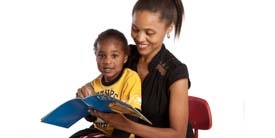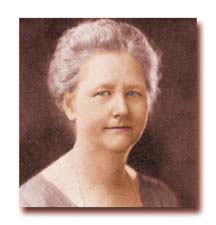Language is how a mother tells her baby "I love you" with a sing-song voice. It's how a 3-year-old tells a knock-knock joke while trying to hold back their laughter. It's how a teacher explains the rules of long division to her fidgety students. Language connects us, and language helps us learn.
At the most basic level, language is a set of symbols that a community has agreed upon to stand for objects and ideas. You use these symbols to talk listen, read, and write. In the case of American Sign Language, you use language to produce signs and interpret signs. Having effective language skills means that you can express your ideas and can understand when others express their ideas. Language is uniquely human, and babies begin to build the foundation for language even before they are born!
It can be helpful to think about the difference between language and speech. When your child says "I wuv my wed twuck," (I love my red truck), it doesn't sound right - that's the speech part - but she is sharing her thoughts on something she really likes - that's the language part.
Language includes which words you know and which words you chose to use. It is how you put those words together, the tone of voice that you use, and whether the person across from you understands what you mean. You use language to solve story problems in math class and write an essay in English class. Language skills are what allow you to build relationships with your family and friends.
Not having access to language is frustrating. Imagine being dropped in the middle of a foreign country with a pounding headache. You need to find a drug store, but how would you communicate what you need? How would you understand directions if someone did figure out what you were trying to say? You're in pain, you're confused, and you can't get your problem solved.
Now think of a two-and-a-half-year-old boy who doesn't yet say any words. His head is full of wants and needs, but he has no clear way of letting others know what they are. He also has trouble understanding what his parents want him to do when they give him simple directions. He often throws things when he can't be understood or doesn't understand what his parents want him to do. All of this is because he has difficulty with speaking and listening, that is, with language.
Language underpins everything we do, and having difficulty with language skills at any age means you can't fully participate in everyday life. Cleveland Hearing & Speech Center has a team of licensed speech-language pathologists (SLPs) with expertise in building language skills.
What is Language?
Tags: Speech, Language, Communication, literacy, Learning, Voice, toddler, talking, Early Intervention, Speech therapy
Build Better Reading Skills in Your Preschooler
Kick start your child’s pre-literacy and language skills by focusing on these areas while reading books with them. Children who develop these skills at an early age are more likely to become fluent readers and better spellers than children who do not. We define these skills as phonological awareness, which is the ability to recognize, manipulate, and use the sound structure of spoken language.
Tags: Speech, Language, Communication, reading, literacy, Learning, toddler, Early Intervention
Speech-Language Concerns? Don't Wait - Evaluate!
“They’re still young - let’s just wait and see.” Coming from a pediatrician, this phrase holds a lot of power over parents worried about their child’s speech and language skills. The parents may have expressed a concern that their two-year-old hasn't started talking yet, is only saying a few words, or is very hard to understand. When the pediatrician brushes it off as not a big deal, the natural response from parents is to trust someone they consider an expert.
Tags: Speech, Language, Communication, toddler, talking, Early Intervention
Baby Sign Language Improves Communication
Infant sign language really does deliver on its promise of improved communication. This is particularly appealing for new parents, given that there’s a well-recognized gap between what babies and toddlers want to say and what they are able to say. Sign language can help ease frustration between ages 8 months and 2 years — when children begin to know what they want, need, and feel but don't always have the oral motor verbal skills to express themselves. Basic sign language can help babies better express themselves as early as 8 or 9 months and it can mean decreased frustration (for both caregiver and child), promote earlier language skills and enhanced bonding with those who sign.
Tags: Speech, Language, Communication, American Sign Language, ASL, Learning, toddler, talking, Early Intervention, Communication Access, Baby Sign Language
Inspiration: A Century of Service at Cleveland Hearing & Speech Center
2021: A Century of Serving Northeast Ohio!
I couldn’t be prouder to lead an organization with a legacy and mission that have stood the test of time. Looking back, there is so much about our story that inspires me. This will be the first in a series of reflections to bring you along on the century-long journey of Cleveland Hearing and Speech Center (CHSC). As you read along, I hope you will share in my sense of awe and wonder as we embark on our second century of serving Northeast Ohio.
Tags: Hearing Aid, Audiology, Language, Hearing Aids, Communication, Hearing, Hearing Loss Prevention, Deaf, Hard of Hearing, Hearing Loss, Cochlear Implants, Deafness, Early Intervention, Communication Access














